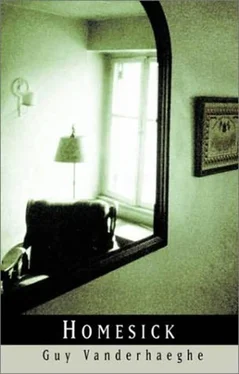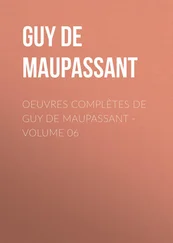
The station had signed off the air and now the empty, flickering screen was bleeding a numb stain of blue light into the darkness of the living room. The sound of rain on the roof, the gurgle of drain pipes discharging water from their throats masked the faint electrical buzz of the television set but did not disturb the two sleepers in the room.
Tonight was professional wrestling, scheduled after the late-night roundup of local news, sports, and weather. Daniel and his grandfather never missed it. The old man egged on the villains in their treachery and pretended to dismiss any possibility of fakery, or the fix. “You can’t tell me that one of those flying leaps off a turnbuckle down onto a man lying defenceless doesn’t do damage,” he would argue.
Daniel, still blind to instances of his grandfather’s irony, would attempt to reason with him. The old man got a kick out of seeing him so serious. “But that’s exactly my point. Don’t you see what I’m getting at? If it wasn’t fixed, if it wasn’t acting, somebody would get killed.”
“Maybe an ordinary man would. But we’re not dealing with ordinary men here. We’re talking blond negroes. Now a blond negro has already defied one law of nature. No reason he can’t do it a second time and survive somebody leaping down on him off a turnbuckle.”
It was really only the sport of arguing that kept them awake, not the wrestling, and after what had happened earlier that evening neither of them had had their hearts in arguing. So they had fallen asleep. Stretched out on the chesterfield Daniel lay closest to the source of light emitted by the television screen. The wavering blue light gave him the face of a boy sunk senseless in six feet of water. Across the room his grandfather slumped in an armchair, dressed incongruously in striped grey flannel pyjamas, plaid carpet slippers, and his straw fedora.
Because he had worn the hat to the supper table there had been a dust-up with Vera. She had understood it as a provocation. That was the word she had used. He hadn’t meant anything by it. He had simply forgot. He was still forgetting the hat even with them living in the house.
She had got on her high-horse, as only Vera could, and spoke of deliberate rudeness, his lack of consideration. He hadn’t had the slightest clue of what she was talking about when she started in on him. “All I ask is that we eat in a semi-civilized manner. You wear that goddamn dirty hat to the table as a provocation, don’t you? Admit it.”
“I don’t have nothing to admit.”
That had started the donnybrook. Hot-tempered as she’d always been, Vera flew off the handle after a couple of exchanges and made a snatch for the offending article, tried to pull off his hat. He had thrown up his arm and knocked her hand away. It was instinct.
“Keep your hands to yourself, girl,” he had warned her, with an old man’s angry dignity.
“Mother may have tolerated eating with a boor in a hat,” she said, “but I’ll be damned if I will.”
It was her daring to bring Martha into it, in the same breath with the hat. “Be damned then,” he said.
Wasn’t it just like her to refuse to take her meal at the table with him? And to insist the boy be her hostage in the living room, the both of them eating with plates on their laps? He knew Daniel hadn’t wanted to join her. She had had to call him twice, in that certain tone of voice, before he finally got up and reluctantly went into the other room with his glass of milk and plate. He was a good boy. He had told himself that it was as much for the boy as himself that he paraded around for the rest of the evening in the hat. He had wanted to show him that everybody didn’t have to wave the white flag where Vera was concerned. Where the hell did that girl get off, telling him what he could and couldn’t do in his own house? She had no business grabbing things from him as if he was a sugar-tit sucking baby. Making him eat alone. He supposed she thought that was some terrible punishment being denied her company for a supper. At least he had eaten in peace.
The old man had begun to stir in his sleep. His massive head, which hung down from his neck like one of the sunflowers in his garden heavy with seed and drooping on its stalk, wobbled. His hands twitched and fumbled on the arms of his chair, opening and closing. Faster and faster the fingers curled and straightened, curled and straightened, until suddenly they shot out rigid and with a sharp, wordless cry Monkman snapped forward in his chair, eyes wide.
He stared into the screen of the television, blue, cold as the ice of the dream from which he had just surfaced. He heard the sound of water trickling in his head. Awake, he was still half-suspended in the chill, watery dark of the dream. Then he realized that the sound of water in his head was the sound of rain, the first in over a month. He passed his hand clumsily over his face and smiled for the sake of the parched garden, smiled to remember it was summer and really there was no ice.
The smile faded when he recalled what the boy had confessed to him. “Mom asked me to find out something from you,” Daniel had announced after Vera had gone to bed and they were alone with their wrestling.
“What’s she want to know now?”
“She wants to know where Uncle Earl is. She said you’d never tell her just to spite her, but she said you might tell me if I got around you right.” The boy looked painfully guilty. “I don’t know. It sounded like spying or something the way she wanted me to do it. I thought if I just came out and asked you straight – that would be better.”
“I don’t know where Earl is,” he had answered. “Tell your mother that.”
With the cold of the dream present in him, more than anything he wanted to talk, wanted to wake the boy. But that would not be fair. He has learned that dreams ought to stay dreams to the young. Nobody ought to show them different. And he cannot allow himself to become a beggar, going crawling to Vera. Having people in the house was supposed to make it easier, instead it had become harder.
Which left Stutz.
To avoid rousing the boy and questions he went as he was, turning on only the kitchen light to find a coat. He stood blinking under the unshaded bulb, wrinkled pyjama legs sagging beneath his overcoat, sockless feet sloppy in slippers, fedora tamped down until it bit his scalp. Then he stepped out into the rain. The abrupt passage from the glare of electric light to utter night left him blinded. It was only prudent to stand and wait for his eyes to adjust. Rain beat down on the stiff crown and brim of his hat, creating an unholy racket, like hail on a tin roof.
For the first time he considered what the hour might be. It had to be well past two. Stutz would be in bed. In his day Alec had knocked on his share of doors early in the morning but carrying a bottle had insured a welcome. What could he carry to Stutz who hated and despised bottles? Corn. Stutz went weak for corn on the cob. Alec had been promising him a feed of sweet corn as soon as it was ripe. Wouldn’t Stutz gawk when he opened his door to a man with his arms stacked with cobs? “Get the glue on your dentures, Stutz,” he’d say, “look what we got here!”
Even after his eyes started to allow for the darkness he couldn’t make out much with the sky overcast, the moon and stars cloaked in cloud. The corn patch had already grown above the height of a man and in among the stalks it was black as Lazarus’s tomb. He picked by feel, running his hands up the plants until they met with an ear to be pinched and measured and judged by his fingers as to plumpness and readiness for eating. Jesus wet work he swore it was, too, puddles standing between the rows and the gumbo sucking the slippers off his feet with every step he took, the long blades of the leaves laying a slash of damp on him wherever they brushed and all the while the rain pissing down for all she was worth. But at last his arms were full, his pyjama legs soddenly clinging to his legs, and he blundered out of the corn patch and into the road, bound for Stutz’s house. The journey had a fugitive, furtive air. Whenever he passed under a streetlight where the rain descended in gleaming, silver lines so straight they appeared to have been drawn with a ruler’s edge, Alec broke into an anxious shuffle and hunched low over his burden. What might people think if they recognized him toting corn through the streets in his sleeping costume?
Читать дальше













